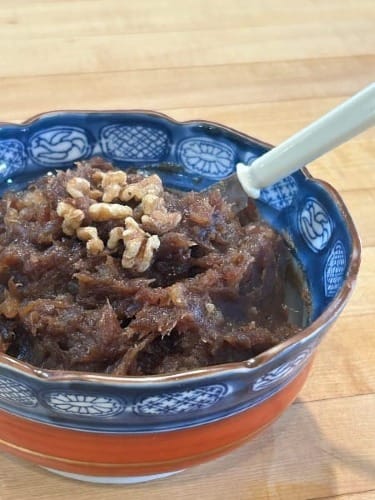Heritage in a Bowl: My Heirloom Haroset

By Claudette Sutton
Passover’s coming. In this chapter of my life, without parents or grandparents, I often feel intimidated by the challenge of sustaining the traditions I’ve inherited and hope to pass them down to my son’s family. Which do I keep? Which adapt? Which jettison as relics not relevant to our lives now?
In one area at least, I feel supremely confident: our Sephardic haroset, made with dates, walnuts, cinnamon, and a splash of red wine. By now I could make it by heart, though I’ll pull out Grandma’s recipe since I make it only once a year. I like to preserve its special status on the seder table, since it is -- how do I say this gently? -- the best.
Don’t get me wrong. I have been a happy and well-fed guest at many an Ashkenazi seder. I have enjoyed a variety of apple-and-walnut harosets, handed down by a succession of beloved bubbes. Still, I’m convinced that in the toe-to-toe, Sephardic haroset will always be the winner.
Of course, we all have a special fondness for foods that carry positive associations from childhood. For me, Sephardic haroset will always carry memories of Grandma’s elegant brown hands smashing the boiled dates with a fork (this was pre-Cuisinart), and mixing in the chopped walnuts with her hands.
It carries a mental image of Sephardic grandmas on all branches of my family tree, splashing red wine onto the mashed dates (and maybe figs or raisins), and passing the recipe down to their children in Ladino, Arabic, or English.
It carries a sense of place. Date palms grow more readily than apple trees in Syria, where both sets of grandparents originated. Syria is also a major growing region for walnuts. The combination makes a perfect stand-in for the mortar our enslaved ancestors in Egypt used for building cities for the Pharaoh, a culinary metaphor for the suffering of enslavement. The fact that it is also delicious doesn’t take it off-message. Suffering is inevitable. Making joy from suffering is a mitzvah.
Some things aren’t so easily conveyed. I wish I could recreate for my son the experience of seeing his grandparents and great-grandparents singing “Who Knows One?” in Arabic at the end of the seder, Grandpa Abe keeping the beat on the table with his open palm, and adults erupting in laughter when someone drops a line in the cumulative song. But even haroset can’t do everything.
In our interfaith home, on the other hand, we share the Passover story with family and friends of various backgrounds, thanks to a Haggadah in Hebrew and English, rather than Arabic. I particularly love the moments when we jump from historic narrative to contemporary issues of enslavement and freedom. Where do we find tyranny in the world today, and what can we do about it? How do we oppress people around us, or ourselves? How are we bound by expectations set for us as children that we no longer wish to carry? Stories can be preserved and evolve too.
Here in Santa Fe, on the front line of family, without parents or grandparents to call or visit, I’m learning as I go along. But one of the cool things about being a grown-up is the opportunity to consider which of our inheritances we want to keep, which to discard, and which new practices we might want to adopt.
Bringing me back to haroset.
Make this simple yet delectable Syrian haroset this Passover, and you might just choose to incorporate it into your seder every year. Trust me: I won’t tell Bubbe.

What you’ll need:
2 pounds pitted dates
1/4 cup red wine
1/2 teaspoon ground cinnamon
1/2 -3/4 cup coarsely chopped walnuts.
What to do:
Put the dates in a saucepan and cover about halfway with water. Bring to a boil, lower the heat, and simmer, stirring frequently, until the dates are soft but not mushy.
Blend the dates in a food processor until the big lumps are gone but it still has some texture.
Transfer to a bowl and stir in the cinnamon and walnuts. Add wine just before serving and mix thoroughly. (Alternatively, you can add the wine while the dates are cooking to burn off the alcohol.) Garnish with a few chopped or whole walnuts.
Enjoy.
Note: This is a traditional Aleppo haroset. Optional “legitimate” Sephardic additions include figs, black or yellow raisins, pomegranate seeds, apricots, pistachios, orange juice, and orange jam.
Community Supporters of the New Mexico Jewish Journal
Jewish Community Foundation of New Mexico
Congregation Albert
Temple Beth Shalom
Jewish Community Center of Greater Albuquerque
The Institute for Tolerance Studies
Shabbat with Friends: Recapturing Together the Joy of Shabbat
Copyright © 2024-2025 New Mexico Jewish Journal LLC. All rights reserved.



